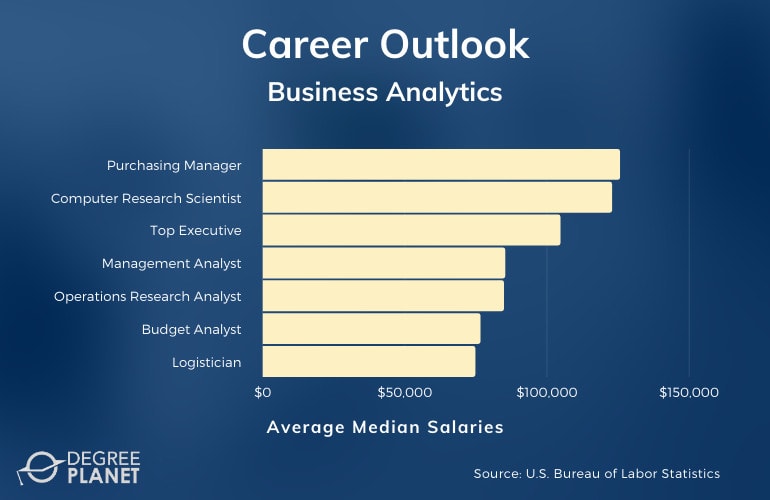Is a master’s in business analytics worth it? If you’re looking at post-baccalaureate degrees to boost your earning potential or improve your employment prospects, a business analytics masters may be worth it.

Editorial Listing ShortCode:
An advanced degree may be a worthwhile investment for your future. If you earn it online, you won’t even be shackled to a traditional college campus. You can enroll, study, and graduate all from the comfort of your own home.
Is a Masters in Business Analytics Worth It?

Yes, a masters in business analytics degree is worth it for many students. The Bureau of Labor Statistics is projecting 5% job growth in business and financial occupations over the next 10 years.
Common business analytics careers in this field include data scientist, market researcher, business consultant, business analyst, and business intelligence officer. There are multiple ways to earn a master’s degree in business analytics.
The most straightforward is a Master of Science (MS) in Business Analytics, but it’s also quite common for students to pursue a Master of Business Administration (MBA) with a specialization in Business Analytics. Some schools also designate a special title for their Master of Science in Business Analytics (MSBA).
You can also look for degrees and specializations in fields related to business analytics. Examples include data analytics, business intelligence, and operations research. So, what is business analytics?
Editorial Listing ShortCode:
Simply put, it’s a field of study that revolves around the data of a business. Whether it’s tracking profits, analyzing performances, or making predictive models for future actions, business analytics is designed to help companies make better decisions through factual, data-driven thinking.
A typical curriculum for business analytics students might include classes in economics, mathematics, computer science, marketing, accounting, and business administration. Many online programs are available for business analytics. These can give you the opportunity to earn your degree without the need for face-to-face instruction.
Many online programs are also designed with things like rolling admissions and self-paced classes to better help working professionals fit them into their schedules. These programs understand that the modern student might be juggling all kinds of responsibilities already, so they’ll need a certain amount of flexibility to go back to school.
If this describes you, consider obtaining a master’s degree in business analytics or a master’s degree in data analytics online. It can have ample career benefits, and it’s usually designed to be as accommodating as possible for busy people who are already part of the workforce.
How to Decide Whether Masters in Business Analytics is Right for You

Business analytics isn’t for everyone. It’s a demanding field that requires multidisciplinary skills in mathematics, computer science, and business acumen. It can also require several years to complete, so it’ll involve a time commitment.
Is an MS in Business Analytics a good match for your goals and interests? Here are just a few signs that it may be the right choice for you.
1. You’re good with data.
Data is the backbone of business analytics. If you are comfortable working with numbers and familiar with the technology that mines, tracks, calculates, organizes and analyzes them, then this might be a good fit for you.
A strong attention to detail is also helpful.
2. You want a specialty in the world of business.

Business analytics is a niche skill within the broader field of business. While you can apply a business analytics degree to a variety of jobs, you might find your options somewhat limited if you want to go outside of business or business data entirely.
It’s a degree that is often best suited for people who already know that they want to pursue a technical or specialized career with high-level credentials.
3. You have the time and money to devote to a master’s program.
Graduate school isn’t easy. It typically requires a significant investment of time and money. Classes can also be challenging, especially if you’re taking online or self-paced programs that require a great deal of time management.
Make sure that you’re ready for the investment before you take the plunge.
5 Things You Can Do with a Master’s in Business Analytics Degree

Most careers in business analytics revolve around the management of data.
This skill set, however, can help you find a wide variety of jobs that complement your unique talents, interests and ambitions.
1. Data Scientist
Like their name suggests, data scientists work with data. Their ultimate goal is to help their company understand the information that’s being generated from sales, stocks, profits, expenses, and other ventures.
What does a data scientist do all day? It depends on the needs of their employer. One day, they might be building statistical models to predict the success of a new product. Another day, they might assess business strategies or advertising campaigns to determine if they’re financially effective.
Editorial Listing ShortCode:
Some data scientists can earn more than $165,000 per year (Bureau of Labor Statistics), so it’s quite the profession for those with a talent for it.
2. Business Analyst

A business analyst is a “jack of all trades” professional that combines crossover knowledge in fields related to business, data, finance, technology, and computer science. Depending on their job, business analysts could spend their time doing everything from database management to project development.
Typical job duties revolve around information technology, risk assessment, quality assurance, and more. Business analysts often make reports and recommendations to executives and shareholders, so there’s a human component to their work as well.
If you enjoy working with data while also playing a pivotal role in the way that a company functions, becoming a business analyst might be a good career decision for you.
3. Market Research Analyst

Market research analysts are responsible for looking at the market and determining the best ways for companies to thrive within it. They might study patterns, calculate risks, forecast market trends, distribute surveys to customers or gather statistics on incomes and demographics.
Another common job duty for market research analysts is competitive analysis…scoping out the competition.
According to the Bureau of Labor Statistics, market research analysts make an average of $65,810 per year, but salaries range from $35,380 to $127,410 per year. The industry is expected to grow by 18 percent within the next decade, adding more than 130,000 new jobs in total. That is why a master’s in business analytics or even a master’s in data analytics is worth it for many students.
4. Statistician or Logistician

While these are completely different jobs, they have a similar foundation in mathematics that often draw business analytics students who are good with numbers. They can be viable and profitable fields for those with talent.
Statisticians use mathematical equations and models to solve problems. In a business setting, this could mean analyzing trends, building predictive models, or even data mining.
Logisticians manage and coordinate the supply chains of businesses. They manage funds, track supplies and expenses, oversee product distribution and liaise between vendors and clients. Logisticians work in almost every industry, including corporate ones.
5. Business Consultant

Another career with a wide range of possibilities, you might enjoy working as a business consultant if you’re a critical thinker and problem solver. Business consultants can find employment in a variety of settings, and their job duties can be as different as the individuals themselves.
Business consultants often work in areas of finance, administration, technology, policy, and human resources. With a background in business analytics, you might find yourself more drawn to data than anything else, but you’ll likely have a variety of options.
Business consultants can work for public or private companies. They can also work for themselves as freelancers.
Business Analytics Degree Alternatives
While a business analytics degree can serve a variety of needs, there are times when another master’s degree might be more uniquely suited for your career goals.
Editorial Listing ShortCode:
Let’s take a look at a few academic disciplines that are similar to but also different than business analytics.
- Master’s in Data Science or Data Analytics. These programs are often offered with business analytics as a concentration. If you want a flexible, broad-ranging degree that isn’t limited to the business world, you might study data in a general way as opposed to business analytics as a specialty.
- Master’s in Business Intelligence. There’s a lot of crossover between business analytics and business intelligence. In fact, some universities treat them interchangeably. Business intelligence tends to focus on the review of past actions and performances, while business analytics tends to gravitate more towards future modeling and predicting. Both can play critical roles in the success of a company.
- Master of Business Administration. This is another option for people who don’t want to lock themselves into a specific industry. Obtaining a Master of Business Administration (MBA) rather than a Master of Science (MS) in Business Analytics can help you learn a wide range of skills that can be applied to multiple jobs, fields and occupations.
What you can do with a masters in data analytics or business analytics may involve everything from finance to computer science. It all depends on your interests.
Business Analytics Careers & Salaries

According to the Bureau of Labor Statistics, the average salary for all business and finance occupations is $72,250 per year. However, this doesn’t take into account the higher paydays for advanced degree holders, and it doesn’t look at specific careers in business analytics:
| Careers | Average Median Salaries |
| Computer or Information Research Scientist | $126,830 |
| Purchasing Manager | $125,940 |
| Top Executive | $107,680 |
| Management Analyst | $87,660 |
| Operations Research Analyst | $86,200 |
| Budget Analyst | $78,970 |
| Logistician | $76,270 |
| Accountant or Auditor | $73,560 |
| Labor Relations Specialist | $73,240 |
| Market Research Analyst | $65,810 |
For the most accurate wage information, look up the full salary range of your chosen career. For example, if you’re thinking about a job as a data scientist, you might make anywhere from $52,950 to $165,230 per year.
That’s a difference of more than $100,000 per year, and it will depend on many different factors such as age, experience, education, and location.
Which is Better MBA or MS in Business Analytics?
If you’re considering a graduate degree in business analytics, one of the first decisions to make is whether to pursue a Master of Science (MS) in Business Analytics or a Master of Business Administration (MBA) with a specialization in Business Analytics.
Both degrees are prestigious, and they’re both recognized by employers within the industry, so it mostly comes down to personal preference.
Editorial Listing ShortCode:
If you want the more specialized degree, the MS will likely be a good fit. It revolves around business analytics in every skill and subject, so it will likely provide the most preparation for specific or technical business analytics careers.
If you want a more general degree, an MBA is probably a better fit. You can still take classes in business analytics, but you can also learn other, broader subjects as part of a multidisciplinary degree program. After graduation, you might also be able to apply your MBA to other fields outside of business.
Is Business Analytics a Good Career?

While everyone has their own opinion about what constitutes a good career, the field of business analytics is typically worthwhile.
According to the Bureau of Labor Statistics, if you become a data scientist, for example, the projected job growth for the next decade is at 31%. If you become an operations research analyst, you’re looking at an estimated job growth rate of 25 percent, which is five times the national average for all occupations. Why does a degree matter?
For high-paying careers in business, a master’s degree can help you stand out from the crowd. A bachelor’s degree is usually considered the minimum, but as the field grows increasingly competitive, more and more employers are looking for standout applicants that have master’s degrees.
Getting Your Master’s in Business Analytics Degree Online

With six-figure salaries and fast-growing occupations, business analytics is often considered one of the most exciting specialties in the industry, and a master’s degree can help you take advantage of its many opportunities.
An online master’s in business analytics is worth the investment for many students. A degree isn’t a guarantee of a job, of course, but it can greatly improve your prospects, and it can serve as both a career boost and a foundation for further study if you ever decide that you’d like a PhD.

